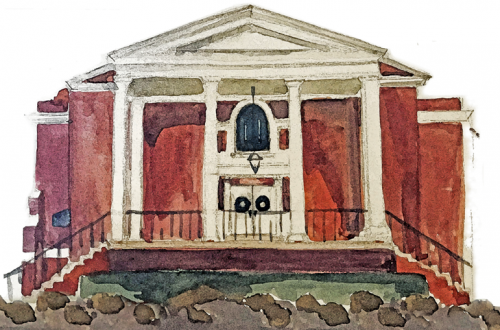I’ve been getting a lot of questions from readers about a piece that I co-wrote with Rosaria Butterfield for The Public Discourse titled “Learning to Hate our Sin without Hating Ourselves.” Rather than trying to answer each reader individually, I am going to try and address these questions individually in a series of blog posts.
The first question is this: Is temptation sinful? Some readers wonder how temptation fits into a paradigm in which desire for sin is itself sin. They object that such a framework makes temptation into a sin. Since we know that not all temptation equals sin (e.g., Heb. 4:15), the thesis of our article fails because we effectively make temptation into a sin.
Before answering the question, let me begin with some caveats. One, the thesis of our Public Discourse piece doesn’t rely at all on an answer to this question about temptation. Two, I can only speak for myself in answering this question. Other people who share my view that same-sex sexual desire is sinful may express themselves differently than I will below. And that’s okay. I expect some give and take on these matters as we all think our way through to biblical clarity. Three, nothing that you read below is new. In fact, it is an adaptation of what already appears in my book Transforming Homosexuality. For the full argument, I encourage you to get the book.
Now to the question of temptation and desire.
All temptation has at least two defining elements—a trial and an enticement to sin. The trial is an experience of testing that often includes suffering or a sense of deprivation. The enticement consists of an allurement to relieve suffering or deprivation through sin.
When Satan tempts Jesus in the wilderness, both elements are present. Jesus’ hunger is a trial that makes him experience physical hunger. Satan offers Jesus bread in order to entice Jesus to relieve that condition through sinful means.1 Although trial and enticement can be distinguished conceptually, they cannot always be separated experientially. Sometimes the trial is the enticement to sin. Sometimes the trial leads to the enticement to sin. In either case, temptation always includes both elements—trial and enticement.
One distinguishing mark of Jesus’ experience of temptation is that the enticement to sin never emerged from his own nature. He was sinless. He had no sin nature. There was nothing in his sinless nature that could have produced a desire for evil. Jesus could experience trials in the same way sinners do. But he never experienced enticement to evil emerging from his own nature. Sinners, however, often experience enticement to evil that originates in their own sinful nature. This is exactly how James describes our experience in James 1:13–15:
13 Let no one say when he is tempted, “I am being tempted by God”; for God cannot be tempted by evil, and He Himself does not tempt anyone. 14 But each one is tempted when he is carried away and enticed by his own desire [epithumias]. 15 Then when desire has conceived, it gives birth to sin; and when sin is accomplished, it brings forth death.
The temptation in “each one is tempted” is explicitly tied to the sinner’s inner inclination. Literally, “each one is tempted when, by his own desire, he is carried away and enticed.” In this context, the desire is itself sinful. How do we know that?
The word translated as “desire” (ESV) or “lust” (NASB) is epithumia. The only time epithumia is good is when it is directed toward something morally praiseworthy. Epithumia is always evil when it is directed toward something morally blameworthy. Thus, “desire” is not neutral anywhere in this text. It is a “desire” that “lures” and “entices.” In short, it is a desire that is directed toward evil. Thus the desire itself is sinful. When such illicit desire conceives, it inevitably gives birth to sin because it is sin. As Doug Moo contends, “James now attributes temptation to each person’s evil desire . . . [defined as] any human longing for what God has prohibited.”2
The text also says that God cannot be tempted by evil but that sinners obviously can be. In what way are we tempted by evil that God is not tempted by evil? Verse 14 gives the answer. We face temptations that arise from our “own desire” (1:14). In contrast, Jesus never faced temptations arising from “his own sinful desire.” As God, he could not and cannot be tempted by evil in this way. His heart never in any degree fixated on evil. Temptation had no landing pad in Jesus’ heart and neither did it have a launching pad from Jesus’ heart. The same is not true of sinners, who are often carried away by their own desires, as James describes it.
We can speak of two different ways of experiencing temptation. On the one hand, there is temptation that comes to us from the outside. Jesus’ temptations in the wilderness were of this sort. The enticement to sin came from Satan, not from Jesus’ nature. On the other hand, there is temptation that comes to us from the inside. In this case, the enticement to sin comes from our own sinful desires. The sinner’s temptations are often of this sort. In his comments on James 1:13-15, John Owen explains,
Now, when such a temptation comes from without, it is unto the soul an indifferent thing, neither good nor evil, unless it be consented unto; but the very proposal from within, it being the soul’s own act, is its sin.3
Temptation is not sinful when it comes at us from the outside. In the wilderness temptation, the enticement to sin came from Satan, not from Jesus. And that is why Jesus was able to be tempted and yet be without sin (Heb. 4:15). But when the enticement to sin emerges from our own sinful nature, that is an entirely different matter. In that case, the temptation itself is sinful. That is an experience that is unique to sinners and that Jesus himself never experienced.
Our sin snowballs, and one sin becomes a temptation for another sin. This never happened with Jesus. Jesus is not tempted by evil in this way. Because he never sinned, he never experienced the snowball effect that we experience. The one who gives in to temptation soon learns that sin does not satisfy sinful desires. It awakens them. And this never happened inside Jesus, but it happens to sinners continuously.
So it is possible to be tempted and not to sin. One can experience a trial and yet feel no desire to relieve that trial through sinful means. Jesus faced such temptations and never sinned either in desire or deed. Sinners can experience trials in the same way and yet not sin. But when sinners are tempted to do evil by their own fallen desires, the temptation itself is sinful.
So is temptation sinful? For Jesus, it was never sinful. For us, sometimes it is, and sometimes it isn’t. In either case, the good news is that God always makes a way of escape (1 Cor. 10:13). And that is a promise we can all count on.
——————–
1 It is not sinful to be hungry or to eat bread. The temptation had to do with procuring the bread on Satan’s terms rather than on God’s. So John Calvin, Commentary on a Harmony of the Evangelists, Matthew, Mark and Luke, trans. William Pringle, vol. 1, Calvin’s Commentaries, XVI (Reprint, Grand Rapids: Baker, 1999), 213-14.
2 Douglas J. Moo, The Letter of James, Pillar New Testament Commentary (Grand Rapids: Eerdmans, 2000), 74.
3 John Owen, “The Nature, Power, Deceit, and Prevalency of the Remainders of Indwelling Sin in Believers,” in The Works of John Owen, vol. 6, Temptation and Sin (repr., Edinburgh: Banner of Truth, 1967), 194. In that same passage, Owen defines what temptation is vis a vis desire: “Now, what is it to be tempted? It is to have that proposed to a man’s consideration which, if he close withal, it is evil, it is sin unto him. This is sin’s trade: Epithumei—’It lusteth.’ It is raising up in the heart, and proposing unto the mind and affections, that which is evil; trying, as it were, whether the soul will close with its suggestions, or how far it will carry them on, though it do not wholly prevail” (ibid.).



